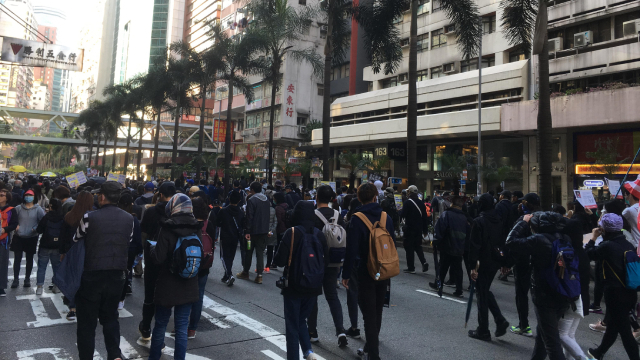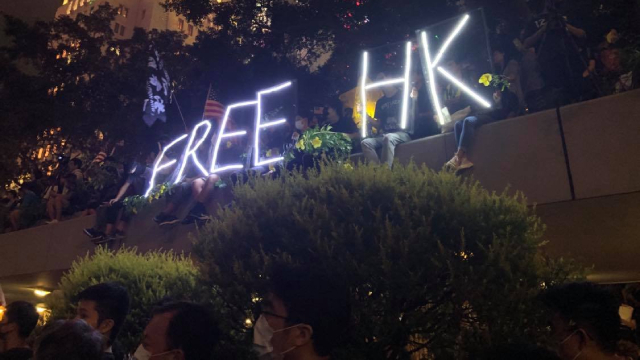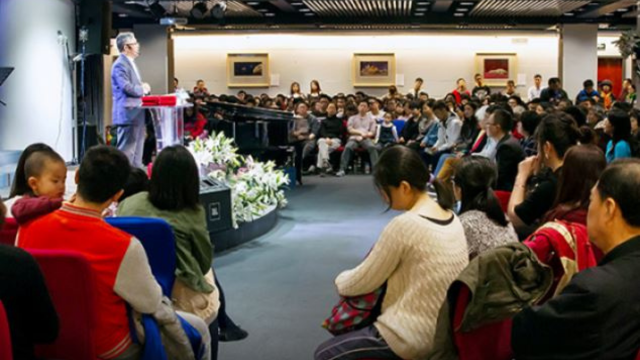

On June 9 last year, some one million Hong Kongers staged a peaceful protest against a proposed extradition law that would allow individuals to be sent to China for trial. Little did they realize it was just the first of more than 1,000 protests in a drawn-out anti-government movement that would plunge the Asian financial hub into one of the deepest crises in its history.
The protests unleashed years of unprecedented anger and frustration at the erosion of freedoms under 23 years of Chinese rule, particularly in recent years when Beijing accelerated political and economic integration to bring the former British colony under tighter control.
The movement has exacted a heavy human cost. Initially peaceful, the demonstrations took a violent turn as the government was seen as turning a deaf ear and police increasingly used tear gas, rubber bullets, water cannons and even live rounds on protesters, who first threw objects and later threw Molotov cocktails, set objects ablaze and wrecked banks, metro stations and pro-China retail outlets.
Although the Hong Kong government belatedly withdrew the extradition bill four months after the initial protests, police brutality and the government’s refusal to launch an independent investigation into police violence further fueled protesters’ anger as some resorted to more radical actions.
More than 8,900 people, of whom about 40% were students, have been arrested in more than 1,000 protests since June of last year.
Although many ordinary Hong Kongers do not agree with violent tactics on either side, many sympathize with the radical young protesters and share their sense of desperation and frustration at a government that seems answerable to Beijing and not ordinary citizens. Hong Kong’s top leader is chosen by a largely pro-Beijing elite committee of around 1,200 people. Only half of the city’s legislature is elected by ordinary voters, and because it is dominated by pro-Beijing lawmakers, it does not have the power to vote down unpopular bills.
“I feel heartbroken that our young people have made so many sacrifices. But if Hong Kong doesn’t resist, then China can do what it wants,” said a 71-year-old retiree surnamed Chow who escaped from China to Hong Kong in his teenage years. “People of our generation were too weak, we didn’t have the courage to fight against China. We simply fled.”
A year after the initial protests, many Hong Kongers are shocked to find themselves in what they consider a much worse situation. Intending to stamp out protests, China’s legislature in late May passed a plan to force sweeping national security laws on Hong Kong to prevent and punish “acts and activities” that threaten national security, including advocacy of secession, subversion, terrorism and foreign interference. Bypassing Hong Kong’s legislature, China’s vaguely defined national security laws will be applied to Hong Kong through an annex of the city’s mini-constitution, the Basic Law. The legislation would also allow Chinese national security organs to set up agencies in Hong Kong.
Many fear that the laws that have been used to suppress activists and government critics in mainland China will now be used to erode most of Hong Kong’s freedoms.
“We used to have the shield of the authorities adhering to some level of international standards to maintain a veneer of respectability and accountability, but that has been shattered,” said Edwin, a 40-year old lawyer. “That is where it gets frightening, because you worry where it all ends when the well-resourced government no longer feels the need to play by any rules whatsoever.”
“There’s also a sense of anger that they could be so brazen and heartless to their own people in a way I would not have imagined a year ago,” he said.
The planned national security law has rekindled protests that had largely died down due to the coronavirus pandemic early this year and fueled an unprecedented demand for independence from China. Many protesters shouted slogans such as “Hong Kongers, build our nation!” in recent protests, which have rarely been heard on the streets before.
The looming draconian laws that many believe would spell the end of Hong Kong led skeptics to wonder whether Hong Kong protesters have taken the right approach in dealing with China. But many who have participated in the movement say they do not regret the resistance, even if it has brought on China’s drastic retaliation.
As China has been tightening its control over Hong Kong they say, the territory’s “death” is inevitable and the protest movement has simply forced China to show its “true face.”
“Do you think the Communist Party would be good to you if you stop resisting? It would tighten its control even more,” said 57-year-old Liu, a driver. “Don’t forget that this is a dictatorial regime.”
“Even if Hong Kong finishes now, it’s visible to the whole word that, for the sake of this (national security), they’d send Hong Kong to its death,” said Vincent, a student in his 20s.
Many say they support international sanctions against China, even if they would hurt Hong Kong’s economy, describing their mentality using the Cantonese expression “lam chow”, which means perishing with one’s enemies. U.S. President Donald Trump said in late May the United States would eliminate special treatment for Hong Kong as a separate customs and travel territory from China for its violation of its promise on Hong Kong’s autonomy.
“I am aware of the impacts of possible U.S. sanctions. But when Hong Kong has to suddenly die like this, I’d support it because we’re desperate and there is nothing else we can do,” said Vincent.
Under the shadow of the looming national security legislation, some vow to continue to speak up even if it means risking jail, while others try to learn how to maintain their resistance and conscience under Beijing’s influence.
“I’d rather speak out and die than to live in silence,” said Chow, quoting a classical Chinese text from the 11th century. “We know we have no means of fighting against China, but we’ll not be subjugated.”
“I’ll still come out to protest. They can kill me if they want to, then people will see their true face,” he said.
Vincent said his way of resistance would be to maintain a sense of Hong Kong identity by up keeping the Hong Kong culture and rejecting China’s ideological assimilation.
Willy Lam, adjunct professor at the Chinese University of Hong Kong, said while he expected the resistance force to weaken, “I don’t think they can successfully suppress it. People won’t be subjugated. Many would go to prison… and many would emigrate.”
Joseph Cheng, retired political scientist at the City University of Hong Kong, said while he did not expect ordinary Hong Kongers to give up on their ideals, “the danger is substantial” under the new security laws.
“The anger is there and the dissatisfaction is there, their will to engage in struggles is there, but there is no easy victory ahead. It’s going to be a very costly and very long-term struggle,” Cheng said.
Source: VOA












